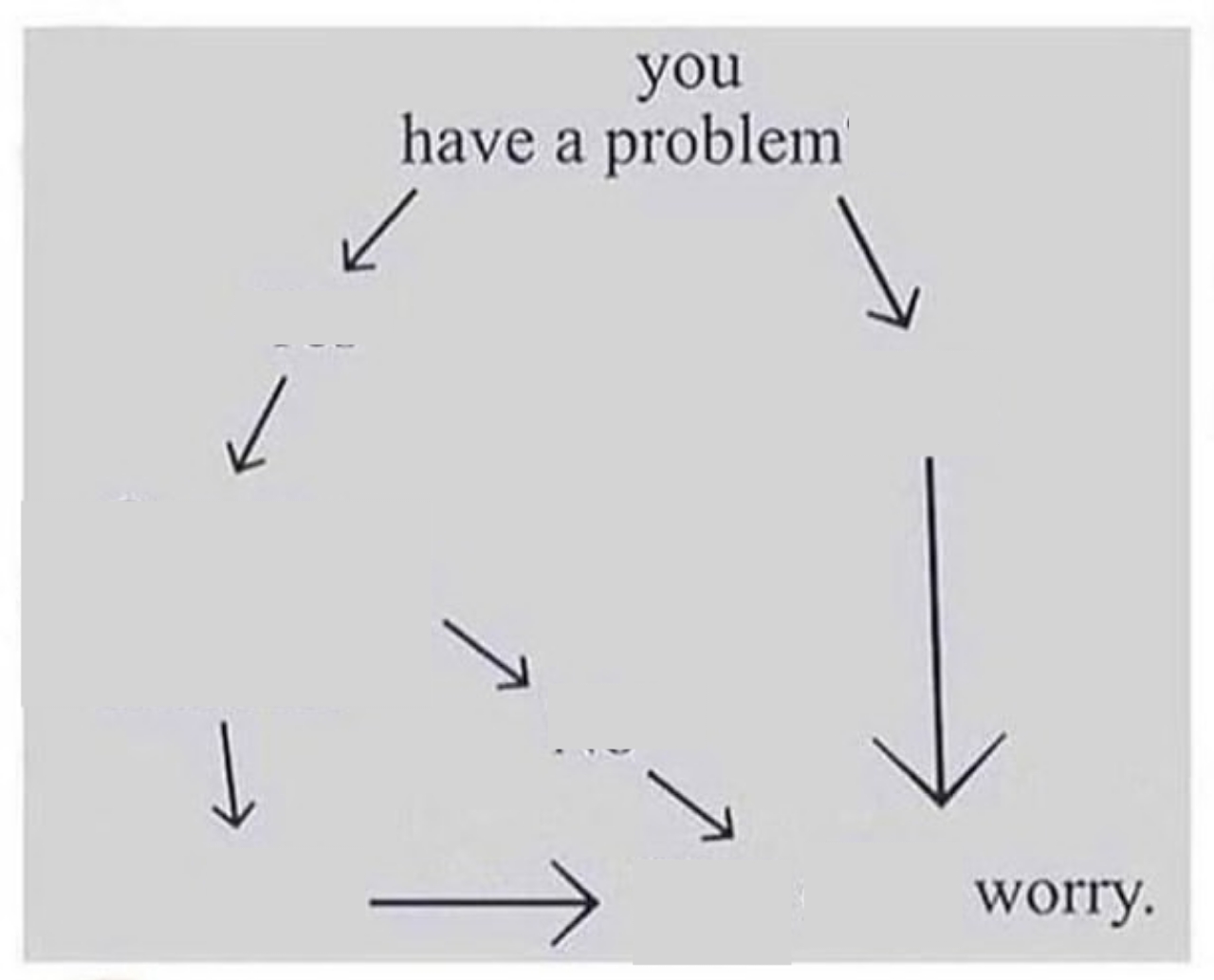This is mine.

Well, your first problem is you have too many arrows.
Better?

This newfound emptiness is distressing. Put them back!
No.


We removed the problem and the worry went away.

unrealistic
distressing
Feels right at home :/
This feel oddly threatening now…
You have a problem. Worry.
Feels like something from inspirobot
Do you have a problem?
Yes
Can you do something about it?
I DONT KNOW
P A N I K
People usually worry because “Can you do something about it -> Yes” involves something unpleasant or work intensive stuff with strict time limit.
I usually worry because “Can you do something about is” is an uncertain variable where I’m not sure how much control I truly have
Also, just because you can, doesn’t mean you should. Maybe it’s a small problem, so you decide to ignore it, and you choose to focus on other, more important things.
No no, all this nuance and logic ruins the meme. Life and the human brain is simple and boils down to a few easy steps
I’m not sure I’d agree with that generalisation.
Is that why you personally worry about something?
Yes, I’m lazy and surrounded by even lazier deadbeats.
When the pain of the solution is less than the pain of the problem, things change.
Do you have a problem? Yes, I don’t have enough money for bills + food.
Can you do something about it? No, I’m on a fixed income.
Then don’t worry. Uh…
I mean if a meteor is coming, I’m not worrying.
Yeah the usual mental worrying part is if you’re just not sure enough if the problem is actually in your reach or not.
Recontextualizing helps me a lot in these situations. So if I’m in your shoes I’d think: The new problem is that I don’t know if I can solve the original problem. Can I do something about that? Yes. Set aside time to focus on it, brainstorm, research, etc. If that comes up fruitful, I’ll do what I found, don’t worry. If it doesn’t, then there’s nothing to do, don’t worry.
You can set a point in the future to revisit and see if anything’s changed, based on how persistent this problem is in your life.
In practice this is easier said than done, of course. I fail to do it sometimes. But it’s a solid strategy that has helped me find a lot of peace. Give it a go!
I agree. Not sure that necessarily means we’re mentally stable.
Well, worrying about it certainly won’t do anything to improve the situation
You CAN do something: change you job, study something to improve your skills, change country if you must.
deleted by creator
Humans are incredible at filtering, therefore a solution can float right on by if it isn’t the “right one”. Also solutions to most problems come by as a result of completely unrelated activity. Therefore it is incredibly important to be doing something, anything that isn’t directly destructive to your goals.
I don’t think that’s true. Humans are incredibly good at solving problems, so I really don’t think “can’t” is really ever applicable. The tighter the spot, the more ingenuity it takes to solve the problem. But a solution can always be found or created.
You may not be able to solve the program now, but you can probably do something to help you solve it later.
This is reductive to the point of absurdity, if this were true no one would ever die from any problem (i.e. drowning, falling, etc.) They’d simply activate ingenuity.
Some problems do not have a solution in a given circumstance.
E.g. I’m locked in a prison on a sinking ship that’s already 1km underwater, and my cell is completely full of water and I’ve held my breath for 2 minutes now.
I should’ve added “given enough time” to that statement.
My take is that if you accept that there’s nothing you can do, then that’s it. If you don’t accept that, you have a chance of improving the outcome, even if it’s small. Giving up never improves your outcomes, there’s always something you can try that both won’t make things worse and might make things better.
In your scenario, you have two options: accept death or try something. Since you aren’t going to make it worse, you might as well try something. Some options:
- pick the lock
- break the lock
- squeeze through the bars
- try to use magic to grow gills or something
Literally any of those has a higher chance of success than doing nothing, and if you had more time, one of the first three might even work. If by some miracle you get out, the next step is to look for a pocket oh air. And so on. Take it one step at a time.
Ok, I can agree with this logic “it’s better to try than to give in” much more than “there’s always a solution”.
That to me still leaves some people starving of hunger due to a lack of money and an excess of bills. But I agree that even in that horrible situation it’s better to keep trying than give in.
I was worried the argument here was closer to “you’re in this terrible situation because you didn’t try enough” which I wholeheartedly disagree with.
I feel now that we’re in agreement though?
If there’s no solution, there’s no point in trying, so you need to believe there’s always a solution. Maybe there’s no apparent solution, but with some effort one can be discovered.
some people starving
And if they do nothing, they will continue to starve. If they try something, maybe they won’t. Some options:
- apply for government assistance, if available
- apply for additional jobs
- scavenge
- sell things to buy food
- change other spending habits
- steal
- commit a crime bad enough to go to jail (prisoners get fed)
Each of those has difference costs, chances of success, and chances of making your situation worse. You know what you’ll get if you do nothing, so it’s probably better to try something.
in agreement
IDK, my goal in online discussions isn’t to reach agreement, but to fully explain my side and understand the other person’s side. Maybe I’ll convince them, maybe they’ll convince me, but either way, the discussion should provide value for the next person who comes along and reads it.
deleted by creator
sure let me just walk to a better country
hey wait why are there people with guns around me
Man the US are not the world, in the civilized world you don’t get shot for migrating…
I wish I was in the us lol
Not always. For example, I’m 100% disabled with a neurodegenerative disease for which there’s no treatment or cure.
This is good advice if you’re not locked in a situation entirely out of your control, but for plenty of people it’s not that simple.
I’m sorry, but all civilized countries in the word offer some social assistance to people in your situation. Put together all disabled people and their families and fight for your rights.
People have been fighting for those rights for decades. That doesn’t change the fact some people are destitute because of health issues with no way to improve their personal situation. And if I had the physical ability to organise people and fight for things, I’d have the ability to work. I’m not sure you know what ‘100% disabled’ actually means.
There are a lot of disabilities, so I don’t know… in my country you could have a 100% physical disability but be in your mind (quadriplegic for example), and in fact there was a person in this condition that fought the government in court and won forcing the government to legislate in his favor and others in similar conditions.
There are a lot of disabilities, so I don’t know.
Look, you should have stopped there.
I don’t think you’re trying to be insensitive, but you are. Do you think I’ve been sitting on my hands saying ‘well this sucks, but I’m not doing anything about it until some random person on the internet tells me to?’
Telling disabled people they should just try harder, and pointing out other people who you think have tried hard enough without knowing any of their personal situations is very callous. You know nothing about me, and even less about those you’re using as an example I should strive towards.
In an effort to help you understand, in an effort towards fostering empathy, I’ll give you a quick synopsis: I fought hard for my career. My upbringing set me up for failure, but I overcame all that and built a fantastic career in software starting in 1998, despite having an 8th grade education and recovering from being kidnapped for sexual purposes.
Within a few years of that, I was designing some of the most popular software on the planet, and was a finalist for the Apple design awards. I never thought I was a victim. Quite the opposite: everything I did was in defiance of what happened to me.
I’ve had a severe genetic issue since birth that made everything hard that whole time. I mostly tried to ignore it, because I wasn’t going to be defined by that. I’m now in my mid 50s, and my condition has become worse steadily over the last 20 years. Nevertheless, I was married for 30 years and raised a wonderful son who is now 25. I worked my ass off, ignoring my condition, for which I said, there’s no treatment or cure. I just lived my life and got very good at being as normal as possible.
The sicker I got (that’s how this works; the older you get, the worse it becomes), the more angry my husband got. It’s hard to deal with something that can’t be fixed. I totally understand how that’s frustrating. I didn’t want to have sex much anymore, because as my intestinal system came under attack, I felt like I had the stomach flu constantly. How horny are you when you’re having constant vomiting and diarrhoea? Every single day for years. I couldn’t eat fruit or vegetables anymore, because my body couldn’t digest it. If I eat a regular hamburger, I shit intact lettuce for days. It took me years to figure out what I could eat, and it’s not much. And eating the wrong thing leads to fainting and seizures. But I was getting flak for not eating around people, like I was trying to make them feel bad.
So after 30 years of doing my absolute best, we divorced. I was the one who asked for it, because I felt he was miserable and I didn’t want to make him suffer for my health issues anymore (he’d made it very clear I was a drag on his life), and I didn’t ask for anything, no alimony, nothing. My life was reset as though I was the 17 year old with no history again. That’s nobody’s fault but my own. Everything had been in his name the whole time, and that’s on me for assuming our relationship would never end.
In the five years since the divorce, while I’ve been getting progressively sicker, I’ve also lost my entire family and all my closest friends to death, and all my pets have died, too. I’ve been completely alone this whole time. But I’ve managed to deal with all these deaths and my deteriorating health, which involves constant diarrhoea and vomiting that’s like having the stomach flu every day for seven years, my mother, aunts, uncles, two best friends, and other friends, three cats, my rabbit, and my dog all dying, and my beloved son moving away.
And during all that, I wrote a novel in an attempt to make money.
And now I’m supposed to deal with not being able to afford food and housing when I have to spend literally five hours every day on the toilet, just wishing it would end. (eta: the next time you have a stomach flu for a couple of days or get food poisoning, think about that lasting for fucking years. That’s my life.) I’m just so very fucking tired.
So please, tell me how I’m supposed to have a stiff upper lip and once again pick myself up by my bootstraps. I’ve already done that multiple times and I’m just done.
Except for the Yes -> Then Don’t Worry part. If there is something that can be done then it should probably be done. Which will take time/effort/expense/cooperation.
Agreed but I think the implication is more “if you can do something about it, then there’s nothing to worry about.”
That’s the entire joke lol
Which I was explaining to the person I replied to. It’s not like I didn’t get it.
My problem is that the "Can you do something about it?" is always unclear, I go back and forth until it consumes my thoughts.
It’s ultimately easy to tell apart because the things in our control have vastly different qualities from those which are not. Quoth Epictetus:
Some things are in our control and others not. Things in our control are opinion, pursuit, desire, aversion, and, in a word, whatever are our own actions. Things not in our control are body, property, reputation, command, and, in one word, whatever are not our own actions.
The things in our control are by nature free, unrestrained, unhindered; but those not in our control are weak, slavish, restrained, belonging to others. Remember, then, that if you suppose that things which are slavish by nature are also free, and that what belongs to others is your own, then you will be hindered. You will lament, you will be disturbed, and you will find fault both with gods and men. But if you suppose that only to be your own which is your own, and what belongs to others such as it really is, then no one will ever compel you or restrain you. Further, you will find fault with no one or accuse no one. You will do nothing against your will. No one will hurt you, you will have no enemies, and you not be harmed.
Aiming therefore at such great things, remember that you must not allow yourself to be carried, even with a slight tendency, towards the attainment of lesser things. Instead, you must entirely quit some things and for the present postpone the rest. But if you would both have these great things, along with power and riches, then you will not gain even the latter, because you aim at the former too: but you will absolutely fail of the former, by which alone happiness and freedom are achieved.
Work, therefore to be able to say to every harsh appearance, “You are but an appearance, and not absolutely the thing you appear to be.” And then examine it by those rules which you have, and first, and chiefly, by this: whether it concerns the things which are in our own control, or those which are not; and, if it concerns anything not in our control, be prepared to say that it is nothing to you.
Now the list of things under our control might seem small – but it’s actually real control. You can’t control that an arrow you shoot will hit the target, a gust of wind may take it away and you’re not controlling the wind. Have the opinion (under your control) that you shall hit, and that gust of wind comes, and when you miss you’ll be wretched, so don’t have that opinion. But still do take that shot unless it’s impossible, in which case find a possible one.
Well, going back and forth is another problem. You should come up with one next step to get closer to solving the problem.
For example, I’m living paycheck to paycheck and don’t have enough to save for “big expense.” The next step is to cut something or find a side job to break the paycheck to paycheck cycle. Once you have a small savings, you can take more risks, like look for a better job, buy stuff in bulk to save money longer term, etc.
You don’t need to solve the entire problem, just figure out what the next baby step toward a solution is.
I try to tell myself that I can’t do anything about it to calm down, then I find a solution and I can do something about it
Why don’t you simply turn off the unwanted emotion??
That’s how emotions work, right? Right, that’s how they work.
TBH it’s a learned skill to stop worrying about something if there’s nothing productive you can do for that problem.
deleted by creator
Explaining this diagram to a guy in the middle of a plane crash, but he just keeps screaming and pounding at the windows.
In the afterlife, first thing he’ll say is 'Don’t EVEN say it…"
I’ve gotten decent at this, but it has taken years of practicing the skill, plus trying various medications. Not to mention a couple of job losses during covid.
The fun combo of adhd and anxiety made this a necessity if I wanted to generally enjoy life.
The ability to not worry about shit sounds simple, but it is much easier said than done. It’s like a muscle that you have to exercise and build up.
Here are the elevator pitched for three topics that helped me:
Mediation/mindfulness: I listened to some Buddhist talks, and liked the way some of them explained focusing on your breath and stepping back to observe your own emotions without embracing those feelings at the time. And you have compassion for yourself, and not judge things negatively. Just observe what is. It’s something you can practice at any time, and the more you do it, the more you can stay in that state while doing other things. There is also a big component of controlling your desires, because those are often a big component of suffering.
Philosophy: around the same time, I was reading stoic philosophy. Marcus Aurelius is the big name there. The bottom line is that regardless of what happens to you, the way that you internally process it and react to it is what really determines how it affects your life & mental state. So with practice, time, and sometimes medication, you are more and more in control of your mental state and how things affect you.
Acceptance and commitment therapy (ACT): The world around you is what it is, so instead of worrying about things you can’t control, you accept the true state of things and then filter that through your personal values to decide how to act.
Some common themes here, to be sure. Along with being able to better control your thoughts and emotions, it’s about finding contentment and tranquility in whatever your life looks like. Not because everything is great, but because your mental state is much more important than reacting how you “should” react.
I just wanted to say I appreciate the way you wrote this and didn’t hide the fact it’s taken you a lot of work, and is an ongoing practice. I see these types of things get suggested far too often without that context. “Just meditate” really takes away from how much discipline over years or a lifetime it takes. There’s nothing easy or quick about it, and it takes a lot of courage to keep it up.
Thanks, I appreciate your reply!
And yeah, I guess it’s easy to gloss over the ongoing nature sometimes. People think “how do I fix myself” but there isn’t ever a fix. There are incremental improvements as long as you’re working at it. But then one day, you look back and realize it has accumulated into a big difference.
This cannot reasonably be how mentally healthy people react though, because this would seem to suggest that the healthy thing to do is to never worry about anything at all, in which case, what utility would have led to that emotion evolving in the first place?
You worry about uncertainty. There is no uncertainty in this flow chart. Worrying about things that are defined and known is not healthy, but that’s not to say that stable people never worry about things they know the solution to or never worry even though there aren’t any real problems. The distinction really is if you’re able to make yourself stop worry or not, in a healthy way, or if worry consumes you to the point of anxiety.
Yup, I rarely worry because I’m prepared for a lot of the most likely issues that could come up. We have:
- a healthy emergency fund, so we can weather unemployment
- food in storage, so we can handle a natural disaster for a least a couple weeks
- two cars and flexible work, so we can handle a car going kaput
- space heaters, so we can handle the furnace going out in the winter
And so on. The more prepared I am, the less I worry. However, it’s impossible to prepare for everything, so I do worry, but I’m able to make that very infrequent with planning.
My brain:
Do you have a problem? -> No -> FREAK OUT!
Do you have a problem? -> No -> Create a problem
This is how I think, but my girlfriend doesn’t, so sometimes it’s really frustrating. I think she is addicted to worrying.
It can be difficult. My partner has anxiety all the time and it is hard to impart the sense of security and stability that I have to her.
Yeah anxiety is a curse. And “just stop worrying” doesn’t help.
Exactly, I’ve worked so hard and come so far to reach peace. It feels impossible to retrace all those steps with someone who’s barely willing. But at least I can be her stability.
Yup, we’re the same way. My SO keeps worrying, “what if X happens? What if Y happens?” and they don’t seem to like my answer of, “we’ll cross that bridge when we get to it.” We’re quite stable financially, so we’re prepared to handle pretty much any surprise, yet she still worries about random things.
I think some people are just predisposed to anxiety. I’m glad I don’t have to deal with that.
Yeah we also have money to handle if something surprising happens, but somehow it doesn’t help her worries either.
It’s not every day she worries, but when she does, it’s a bit exhausting to listen to, specially since there isn’t any action to take to fix it.
Yup, we have the exact same problem.
I’ve found, “I don’t know, let’s look into it” to be pretty effective at switching from worrying to problem solving, and as we go, my SO will usually get over the worrying and apologize for being dramatic. It doesn’t always work, but maybe it’s worth a shot.
Yeah you are right, that works for me too. I guess what she really wants is someone to just listen and be supportive, and not necessarily solve the problem (since it can’t be solved also).
Sometimes they want to be validated, sometimes they want to be assured that it’s going to be okay. And I’m bad at telling which is which.
Replace “Then don’t worry” with “If you really think about it you should definitely be worried” and this is my life.
I guess the thing missing from the chart is “can you do something about it?” -> “do something” -> “don’t worry.” Worry is only useful in that it prompts us to go “this thing could be a problem” and take action to address it. If we can’t do anything about it (or aren’t deciding to do something) then devoting energy and thought cycles to worrying doesn’t benefit us.
I mean, that’s how my ADHD and anxiety combo works: every waking moment is either
A: really thinking about everything, including completely inconsequential stuff, my brain making me super worried about most of it
Or
B: trying with various degrees of success to distract myself away from doing A. This in turn often tends to make me forget things that I DO need to be aware of, such as appointments etc, worsening A.
It’s so fucking exhausting tbh 😮💨
Also, deliberately ignoring things you’re worrying about backfires when they do come to pass, because then you feel guilty for ignoring them and like you’re losing control.
At least it’s like that for me. Perhaps not for you, I hope so!
Yup. Happens less than it used to but still keeps happening. I hope it’ll become less frequent for you too, if not stop completely…
Thanks 😊 I’m in a period of high personal change so it just comes with the territory I guess. I’m glad it improved for you!
Thanks 😁🫶
I hope all the change stuff works out well too!
If the answer is ‘maybe’ then you are allowed to worry.
Anything -> worry




















